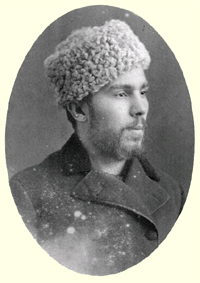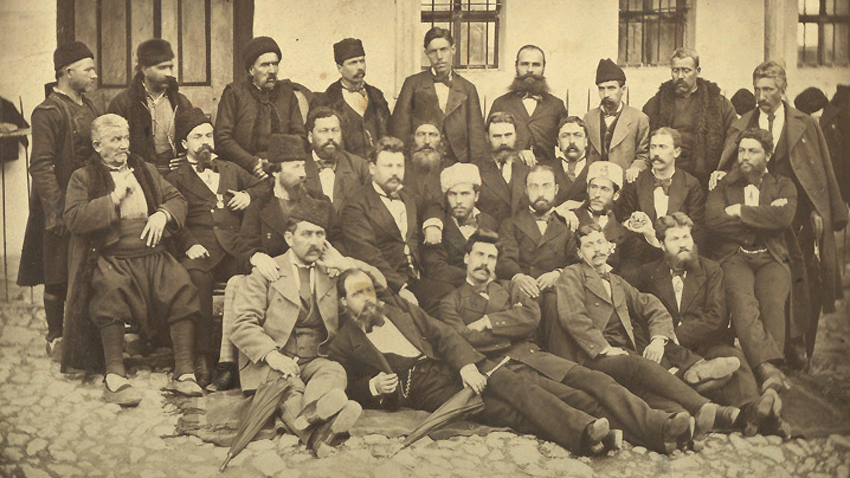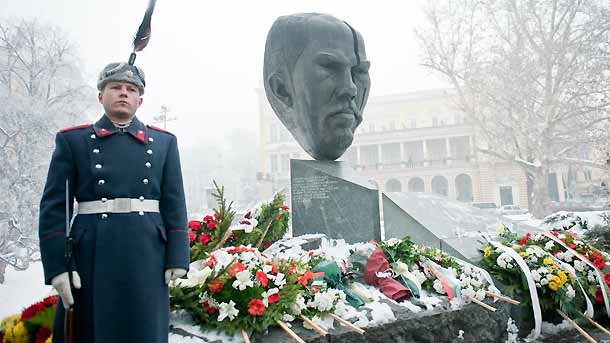Bulgaria marks the 160th birth anniversary of Stefan Stambolov - a Bulgarian revolutionary, poet and statesman. No matter how controversial the evaluations about Stambolov are, one thing can not be contested. During Stambolov’s government when he was Bulgarian Prime Minister (1887-1894) the start of the modern European development of this country was given, even if it had to be done with the use of brute force. This is why French newspaper Le Figaro once wrote the following: “Stambolov embodies the Bulgarian energy”.
According to Professor Milko Palangurski from the Saint Cyril and Methodius University in Veliko Tarnovo, not many people to the world history have Stefan Stambolov’s biography. He was among the lucky ones who had the opportunity to destroy empires and build states. All this happened in a life that lasted for 41 years only.
 “Stefan Stambolov was born on January 31, 1854 in an ordinary family in the town of Veliko Tarnovo. His family had a small business”, says Professor Palangurski. “Until his 23rd birthday Stambolov participated in a church movement and was also part of the Odessa Ecclesiastical Academy, but was later expelled from it due to his revolutionary activity. Later he became an Apostle of the Bulgarian revolution, an inheritor of Bulgarian Apostle of Freedom Vasil Levski and founder of many revolutionary committees. He also led the Uprising of Stara Zagora against the Ottoman enslavers in 1875 and was one of the leaders of the April National Uprising in 1876 in the First Revolutionary Committee. During the Russo-Turkish war in 1877-1878 Stambolov took part in the Bulgarian intelligence network which helped the Russian army put a successful end to its military actions. When Stambolov was only 24 he used to stand near the gates of the First Bulgarian National Assembly, because he was not old enough to become an MP and take part in the development of the Bulgarian Constitution. ”
“Stefan Stambolov was born on January 31, 1854 in an ordinary family in the town of Veliko Tarnovo. His family had a small business”, says Professor Palangurski. “Until his 23rd birthday Stambolov participated in a church movement and was also part of the Odessa Ecclesiastical Academy, but was later expelled from it due to his revolutionary activity. Later he became an Apostle of the Bulgarian revolution, an inheritor of Bulgarian Apostle of Freedom Vasil Levski and founder of many revolutionary committees. He also led the Uprising of Stara Zagora against the Ottoman enslavers in 1875 and was one of the leaders of the April National Uprising in 1876 in the First Revolutionary Committee. During the Russo-Turkish war in 1877-1878 Stambolov took part in the Bulgarian intelligence network which helped the Russian army put a successful end to its military actions. When Stambolov was only 24 he used to stand near the gates of the First Bulgarian National Assembly, because he was not old enough to become an MP and take part in the development of the Bulgarian Constitution. ”
However, Stambolov was the man who later controlled the behavior of the Bulgarian MPs during the foundation of the new Bulgarian state.
“He was everything a Bulgarian statesman could be - a leader of a political party (the Peoples’ Liberal Party), a member of the Parliament, Bulgarian regent and among the Bulgarian Prime Ministers with longest period in office”, says Professor Milko Palangurski. “Stambolov managed to introduce a strict discipline and constitutional behavior at the National Assembly and also succeeded in imposing his will on two Bulgarian monarchs- King Alexander of Battenberg and King Ferdinand. He also established one of the strongest political parties and laid the foundations of the social, economic and political modernization of Bulgaria when he became a Prime Minister.”

According to Professor Palangurski, the foundation of institutions which are functioning even at present started back in the time when Stambolov was Bulgaria’s Prime Minister. This basically defined the destiny of Bulgaria- to become a European-orientated country and avoid Asian despotism. This is why the last sentence which came under Stambolov’s pen was: “I paved the road of Bulgaria with Roman cobbles”. During Stambolov’s government the foundations of the Bulgarian Railways, ports, the Bulgarian Post, the State printing house and the Sofia University were laid. The first Bulgarian trade exhibition was also held at that time.
 “No other Bulgarian Prime Minister embodied to such an extent the pro-European orientation of this country. The law observance, the functioning of the certain state and political systems-police, army, educational system and civil relations, everything was imposed with the use of brute force, so that the Bulgarian society could start functioning in that direction. Stambolov’s time was the last one when pre-liberation and oriental mechanisms were imposed in the government of the Bulgarian society.”
“No other Bulgarian Prime Minister embodied to such an extent the pro-European orientation of this country. The law observance, the functioning of the certain state and political systems-police, army, educational system and civil relations, everything was imposed with the use of brute force, so that the Bulgarian society could start functioning in that direction. Stambolov’s time was the last one when pre-liberation and oriental mechanisms were imposed in the government of the Bulgarian society.”
More features of his personality could be found in the book entitled Stefan Stambolov- the Bulgarian Energy written by Dimitar Ivanov. One can find in the book quotations of Petar Grudev’s words who served as Bulgarian Prime Minister in the period March 16, 1907- January 29, 1908. Grudev was one of Stambolov’s closest friends in the last months of his life. Here is what Petar Gudev said: “There was a feature in the character of Stambolov which outlined the dictator. He imposed his opinions and decisions on everyone-starting from the Bulgarian MPs all the way to the state employees. He used to say: ”I want this to happen my way. He used to say this even if it was not in his personal favor. Thus, Stambolov took the whole responsibility for the country’s government and its destiny. He did not hide behind anyone else’s back, neither behind the monarchy, the National Assembly and the peoples’ will”.
The implementation of the state system at that time was linked with the use of brute actions by the authorities, violence and even sometimes police arbitrariness. This is what unites the rivals of Stefan Stambolov who multiply now. Stambolov’s tragic end came in July, 1895, when he was literally slaughtered in the street. Today his monument depicting his slaughtered head is situated in a park in Sofia’s city center.”
English version: Kostadin Atanasov
In its latest digital section “Buildings Tell a Story”, the Regional History Museum – Sofia presents the stories of iconic buildings in the center of the Bulgarian capital city, as well as of the people who once lived in them. The video initiative..
T he Supreme Court of Cassation has given final judgement that the Bulgarian Orthodox Old Calendar Church must be registered in the register of religious denominations. This isthe first time a second Orthodox church will be registered, the..
The Arbanasi architectural reserve near Veliko Tarnovo is one of the most popular tourist destinations . The medieval monasteries and churches, including the Church of the Nativity, are particularly attractive. The churches of Arbanasi are museum sites..

+359 2 9336 661
